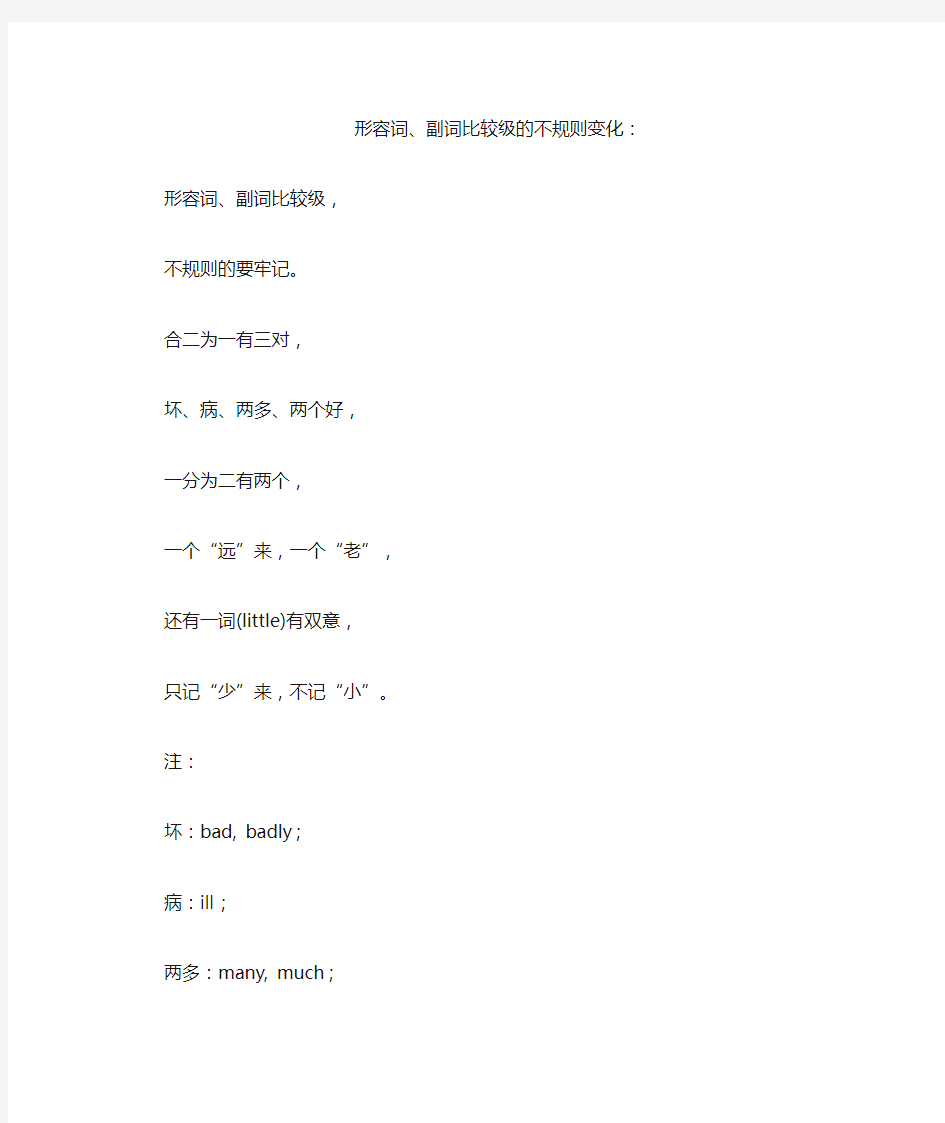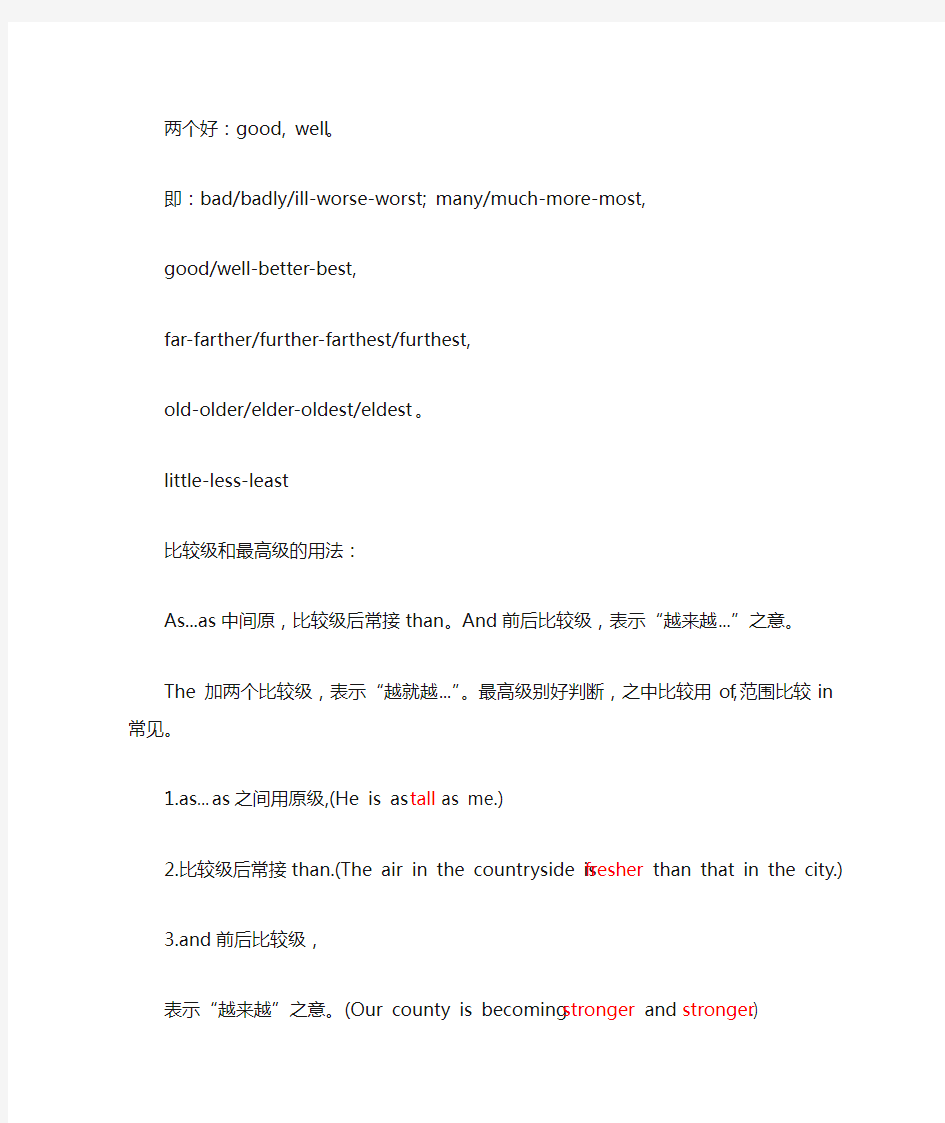特殊形容词和副词的不规则变化


形容词、副词比较级的不规则变化:
形容词、副词比较级,
不规则的要牢记。
合二为一有三对,
坏、病、两多、两个好,
一分为二有两个,
一个“远”来,一个“老”,
还有一词(little)有双意,
只记“少”来,不记“小”。
注:
坏:bad, badly;
病:ill;
两多:many, much;
两个好:good, well。
即:bad/badly/ill-worse-worst; many/much-more-most,
good/well-better-best,
far-farther/further-farthest/furthest,
old-older/elder-oldest/eldest。
little-less-least
比较级和最高级的用法:
As...as中间原,比较级后常接than。And前后比较级,表示“越来越...”之意。
The 加两个比较级,表示“越就越...”。最高级别好判断,之中比较用of,范围比较in 常见。
1.as…as之间用原级,(He is as tall as me.)
2.比较级后常接than.(The air in the countryside is fresher than that in the city.)
3.and前后比较级,
表示“越来越”之意。(Our county is becoming stronger and stronger.)
4.The加两个比较级,表示“越…就越…”。(The more you read, the more you know.)
5.最高级别好判断,
之…中比较用of,(Li Lei is the tallest of all.)
范围比较in常见。(Li Lei is the fastest in our class.)
形容词变副词规律总结 (图表)
形容词变副词规律总结(图表)已仔细核对,无错误,可放心下载 规则变化 范围 大部分形容词变化规则 加ly例词 careless----carelessly quiet----quietly different----differently 辅音加le结尾的形容词变le为lypossible----possibly terrible----terribly comfortable----comfortablygentle----gently simple----simply whole-wholly(例外) 元音字母加le结尾的形容词 以y结尾且读音为/ i /结尾 的形容词加ly 变le为lysole-solely easy----easily angry----angrily noisy----noisily
happy----happily heavy----heavily healthy----healthily 以y结尾且读音为/ ei /结尾的的形 容词加lyshy-shyly dry-dryly gay--gayly/gaily 不规则变化 本身既是形容词也是副词,无需改变fast----fast early----early high----high hard----hard late----late far----far wide----wide alone----alone 形容词和副词为完全不同的单词 初中阶段唯一一个需要去掉字母e的单词 虽然以ly结尾,但却是形容词,不能直接用来修饰动词good----well true----truly friendly
英语形容词名词动词-副词-互变方法规律
英语形容词,名词,动词,副词互变方法规律 一.名词变形容词: 1.名词后加-y, 如: luck→lucky, cloud→cloudy; wind→windy; rain→rainy; sun→sunny, snow→snowy noise-noisy health→healthy 2.在名词后加-ly, 如: friend→friendly love→lovely day→daily 3.方位名词加-ern,如: east→eastern west→western south→southern north→northern 二.动词变形容词 1.词尾加ful: use - useful, care - careful, help - helpful, thank - thankful peace - peaceful, forget - forgetful, play - playful,
succeed - successful, wonder - wonderful 2.词尾加d或ed: please - pleased, unite - united, excite - excited, surprise - surprised, organize - organized, close - closed, wound - wounded, relax - relaxed,develop - developed, appreciate - appreciated,frustrate - frustrated, interest - interested, annoy - annoyed, use - used, frighten - frightened, crowd - crowded, thrill - thrilled, pollute - polluted 3.词尾加ing: interest - interesting, surprise - surprising, excite - exciting develop - developing, frighten - frightening, thrill - thyrilling
形容词不规则变化列表
形容词不规则变化列表 不规则动词分类记(Irregular Verb Forms)
双写结尾的辅音字母,再加-ed的过去式。如:stop—stopped,trap-trapped drop-dropped plan-planned refer—referred prefer— preferred fit—fitted beg—begged nod-nodded permit—permitted admit-admitted shop-shopped 双写结尾的辅音字母,再加ing的现在分词如:sitting running getting cutting stopping beginning planning permitting ridding hitting letting shutting setting swimming
双写结尾的辅音字母,再加er的比较级 sad red ~big~hot~wet~fat thin~红大热湿胖瘦 以不发音的—e 结尾的动词,去—e ,再加-ing。 coming taking firing encircling writing becoming breathing leaving 人称代词,物主代词,反身代词一览表 简单句五种基本句型: 常见的以ant,ent 结尾的名词:merchant, agent,servant 常见的以ar结尾的名词scholar,liar, beggar 常见的以ee结尾的名词employee,examinee ,interviewee, trainee 常见的以er结尾的名词banker,teacher ,waiter,villager, Londoner, observer 常见的以ess结尾的名词actress,hostess,manageress 常见的以age结尾的名词courage, storage,marriage shortage 常见的以al结尾的名词refusal,arrival,survival,approval 常见的以ment结尾的名词 treatment,movement, judgment,punishment, argument 常见的以ness结尾的名词goodness,kindness, tiredness,friendliness 常见的以ship结尾的名词hardship, membership, friendship 常见的以th结尾的名词depth,wealth,truth, length, growth
英语形容词-名词-动词-副词-互变方法规律
英语形容词-名词-动词-副词-互变方法规律
英语形容词,名词,动词,副词互变方法规律 一.名词变形容词: 1.名词后加-y, 如: luck→lucky, cloud→cloudy; wind→windy; rain→rainy; sun→sunny, snow→snowy noise-noisy health→healthy 2.在名词后加-ly, 如: friend→friendly love→lovely day→daily 3.方位名词加-ern,如: east→eastern west→western south→southern north→northern 二.动词变形容词 1.词尾加ful: use - useful, care - careful, help - helpful, thank - thankful peace - peaceful,
forget - forgetful, play - playful, succeed - successful, wonder - wonderful 2.词尾加d或ed: please - pleased, unite - united, excite - excited, surprise - surprised, organize - organized, close - closed, wound - wounded, relax - relaxed,develop - developed, appreciate - appreciated,frustrate - frustrated, interest - interested, annoy - annoyed, use - used, frighten - frightened, crowd - crowded, thrill - thrilled, pollute - polluted 3.词尾加ing:
常用的不规则变化的形容词的比较级和最高级
3. 只能修饰原级的词:very, so, too 等。如他非常累。 可以修饰比较级的词: much, a lot, a little 等。如 than Lesson Two.第一课比第二课容易得多。 大多数形容词和副词可直接在词尾加-er ,–est ,如—shorter—shortest slow—slower—slowest quick—quicker –quickest 以e 结尾的形容词和副词,在词尾加-r,–st ,如—nicer –nicest 以辅音字母加y结尾的形容词、副词变y为再加-er ,-est, early—earlier—earliest 以重读闭音节结尾末尾只有一个辅音字母的形容词、副词两辅夹一元 -er,est,如—bigger—注常用的有五个big fat hot thin red,可以这样记大胖子热瘦子是红色的 不规则的形容词、副词的比较级最高级—more—most good/well—better—best bad/badly—worse—worst little—less—least 常用的不规则变化的形容词的比较级和最高级: 原级一一比较级一一一最高级 Good -_________________-_________________ Many -_________________-_________________ much-_________________ - _________________ bad -_________________ - _________________
写出下列形容词副词的比较级最高级。 young _______ _______ large _______ _______ far _______ _______ easy _______ _______ much _______ _______ little _______ ______ small _______ _______ late _______ _______ fat _______ _______ busy _______ _______ red _______ _______ good _______ _______ delicious ______________________________________ ________________________________ beautiful ________________________________ __________________________ 用所给的形容词副词的适当形式填空。 A. T om is ______________ (tall) than Jim. B. Li Lei is _________________ (young) boy in his class. C.I think English is ___________________________ (interesting)than any other subjects. D.David has _____________________________ (many)story books of all the students. E.Li Lei speaks English _______________________________ (well) in his group. F.Lucy runs __________________________________ (quickly) than Lily.
后缀ly_形容词变副词一般规律
形容词变副词 (1)直接加ly,especially carefully excitedly politely mostly, recently loud-loudly clear-clearly (2)以le 结尾的形容词去e加ly构成副词 Possible -possibly simple-simply comfortable-comfortably terrible-terribly suitable-suitably able-ably gentle-gently (3) 以辅音字母加y结尾的单词,改y为i加ly happy-happily heavy-heavily healthy-healthily noisy-noisily lucky-luckily angry-angrily easy - easily (4)good - well (5)既可作形容词也可作副词的单词 hard early fast high wide (6)compare(比较1):true-truly ,safe-safely compare(比较2): hard (adj/adv努力) hardly (adj几乎不) (7)注意:有些单词有ly ,它不是副词,而是一个形容词 friendly,lovely, likely, lonely,elderly, 比较:动词open close 形容词open (开着的)closed (关上的) opened open的过去式形式做为一个过去分词,opened有时可以做形容词性使用,如an opened door,一扇被打开的门。但在表述门开着的状态的时候,不可把opened用作形容词,而要用open,这是一些人常犯的错误
动词不规则变化形容词副词
不规则动词过去式过去分词巧记表 AAA 型过去式、过去分词与原形一致 cut cut cut 切、割 shut shut shut 关、闭(门窗) 置 put put put 放 let let let 让 set set set 设置 hit hit hit 撞击 hurt hurt hurt 受伤; 疼痛 cost cost cost 值… 钱; 花费 读 AAB 型过去式与原形一致 beat beat beate n 击败 ABA 型过去分词与原形一致 run ran run 跑步; 逃跑 come came come 来 become became become 变得;成为 ABB 型过去式与过去分词一致 buy bought bought 买 fight fought fought 打架; 打仗 think thought thought 想;认为 seek sought sought 寻找; 探究 bring brought brought 带来 lend lent lent 借出 catch caught caught 抓住;接住 teach taught taught 教;教书 send sent sent 送;派遣 spend spent spent 花费(时间、金钱)build built built 建设;建立 leave left left 离开 feel felt felt 感觉;摸起来 keep kept kept 保持 保留 sleep slept slept 睡觉 oversleep overslept overslept 睡过头 sweep swept swept 打扫 mean [mi:n] meant [ment] meant [ment] 意思是 learn learnt / learned learnt /learned 学会 burn burnt / burned burnt / burned 燃烧;烧伤 听见 lead led led 领导;致使 跑 meet met met 遇见; 碰至U lit/lighted 点燃 get got got 获得;得到 dig dug dug 挖掘 read [ri:d] read [red] read [red] 朗读; 阅 feed fed fed 喂养;喂食 shoot shot shot 射击 hear heard heard fl ee f|e d f|e d 逃 light lit/lighted hang hanged hanged 绞死 sit sat sat 坐下 stick stuck stuck 朿刺; 戳 hang hung hung 悬挂 sell sold sold 出售 tell told told 告诉 win won won 获胜; 赢得
形容词变副词规律总结 图表
形容词变副词规律总结(图表) 规则变化 范围 大部分形容词变化规则 加ly例词 careless----carelessly quiet----quietly different----differently possible----possibly terrible----terribly comfortable----comfortably gentle----gently simple----simply whole-wholly(例外) sole-solely easy----easilyangry----angrilynoisy----noisilyhappy----happilyheavy----hea vilyhealthy----healthilyshy-shyly dry-dryly gay--gayly/gaily fast----fast early----early
high----high 1 / 5 hard----hard late----late far----far wide----wide alone----alone good----well true----truly 辅音加le结尾的形容词变le为ly 元音字母加le结尾的形容词加ly 以y结尾且读音为/ i /结尾的 变le为ly 形容词 以y结尾且读音为/ei/结尾 加ly 的的形容词 不规则变化 本身既是形容词也是副词,无需改变 形容词和副词为完全不同的单词 初中阶段唯一一个需要去掉字母e的单词
lively 2 / 5 虽然以ly结尾,但却是形容词,不能直接用来修饰动 lovely 词 lonely Likely wide(形容词,宽阔的,睁大的)----wide(副词,睁大地)/widely(副词,广泛地),late(形容词,有些形容词本身即为副词,同时也有加ly的副词形式。 晚的)-----late(副词,晚地),lately(最近)但加不加ly意思不一样,使用时需注意 high(形容词,高的)----high(副词,高地)/highly(副词,高度地) 特别容易犯错的副词 形容词 hard副词 hard备注 hard副词容易写成hardly, hardly意思为“几乎不”,与hard无任何关系 friendly
形容词变副词规律和特殊情况
一、形容词变副词规律及特殊情况 1.一般直接加ly careless-carelessly confident-confidently fortunate-fortunately 2.以le结尾的形容词去e加y terrible-terribly possible-possibly comfortable-comfortably gentle-gently 3.其他以e结尾的形容词直接加ly wise-wisely nice-nicely entire-entirely absolute-absolutely 4.以辅音字母+y结尾的,变y为i+ly happy-happily easy-easily angry-angrily merry-merrily
5.以ic结尾的+ally specific-specifically basic-basically scientific-scientifically 6.adj和adv同形 fast-fast early-early hard-hard late-late far-far alone-alone little-little 7.有两个副词形式的词 high-high/highly deep-deep/deeply hard-hard/hardly close-close/closely wide-wide/widely loud-loud/loudly late-late/lately 有无-ly意义大不相同的副词:
? ??dead 完全,绝对 be dead asleep deadly 非常 be deadly tired ???pretty 相当 be pretty certain that...prettily 漂亮地 be prettily dressed ? ??close 近 Don't sit close.closely 密切地 Watch closely ! ? ??late 晚,迟 arrive late lately 最近 I haven't seen him lately. ? ??hard 努力地 I study hard.hardly 几乎不 I could hardly recognize her. 8. 特殊 true -truly whole -wholly full -fully dull -dully public -publicly shy →shyly 9. 以ly 结尾的adj. friendly lovely lonely silly deadly lively(生动的,活泼点) manly womanly elderly brotherly fatherly motherly daily weekly monthly yearly
形容词变副词的方法
形容词变副词的方法 形容词变副词的方法释疑 形容词变副词时有什么规律??有没有形容词副词同形的?如fast 即做adj.(形容词) 又做 adv.(副词)。 答:形容词变为副词的方法一般在形容词的词尾加-ly 可以变成副词。例如:quick—quickly, slow—slowly,
loud—loudly, sudden—suddenly 等。但是,以下几点值得注意: 1. 一些以“辅音字母+y”结尾的形容词,要把y改为i再加-ly. 例如:happy—happily, angry—angrily, lucky—luckily, heavy—heavily, noisy—noisily 等。 2.有些以-ble或-le结尾的形容词,去掉e加-y. 例如:possible—possibly, terrible—terribly等。
3. 少数以e结尾的形容词,要去掉e再加-ly. 例如:true—truly等。但绝大多数以e结尾的形容词仍然直接加-ly. 例如:polite—politely, wide—widely,nice--nice ly 等。 4. 以-l结尾的形容词变为副词时仍然要在词尾加-ly,除非是以-ll结尾的才在词尾只加-y. 例如:usual—usually, careful—carefully, useful—usefully, full—full y
等。 同形的副词和形容词 fast train 快 车 hard workers 干活卖力的工人 run fast 跑得 快work hard 干活卖力,工作努力 right answer 正确的回 答enough food 足够的食物 do everything right 样样事情做得对large enough 足够
形容词变副词的一般规则
形容词变副词的一般规则 形容词变副词通常是加ly,其变化有规律可循,请记住以下口诀: 一般直接加,“元e”去e加,“辅y”改i加,“le”结尾e改y。 分别举例如下: quick-quickly; true-truly;happy-happily; pssible-possibly 具体规则如下: 1.一般情况下直接加“ly”,如: quick-quickly;polite-politely;sad-sadly;imediate-immediately;recent-recently 2.少数以e结尾的形容词,要去掉e再加-ly。如:true-truly; due-duly 绝大多数辅音字母加e结尾的形容词直接加-ly。如: polite-politely;wide-widely;wise-wisely;nice-nicely 3.以“y”结尾的,且读音为/ i /,先将“y”改成“i”,再加“ly”,如: happy-happily;heavy-heavily;angry-angrily;busy-busily 但是如果读音为/ ai /,直接加ly,如:dry-dryly; sly-slyly;shy---shyly 4.以ic结尾的词,加ally,如: economic-economically;basic-basically;scientific-scientifically;automatic-automatically; energetic-energetically; 但是public-publicly例外。 5.以辅音字母加le结尾时,去e加y,如: simple-simply;considerable-considerably;terrible-terribly gentle-gently;possible-possibly;probable-probably; incredible-incredibly 元音字母加le时加ly,如:sole-solely。但是whole-wholly例外。
形容词变副词规律总结 图表
形容词变副词规律总结 (图表)已仔细核对,无错误,可放心下载
1、 Mrs White smiled _____ ( happy) when she received a present from her daughter、 2、 Why do you think you did so ___________(terribe)in your test? 3、We can __________(easy) forgive a child who is afraid of the dark, but we can’t forgive
an adult who is afraid of the light、 4、 Congratulations! You’ve answered all the questions _________(correct)、 5、The computer is ______( wide)used in our daily life、We can do many things with it、 6、I changed into my sports shoes so that I could walk more ____________(comfortabe)、 7、Mary passed her examination because she studied very ________( hard )、 8、“Why didn’t you tell me earlier?” The boss shouted _______(angry)、 9、It’s ___(true) possible that robot teachers will be popular in schools some day、 10、 How _________(comfortable) the giant pandas are living in Taiwan! 11、Miss Xu smiled and said to me ________(soft), “Never mind, my boy!” 12、Last night it rained __________(heavy) in the southern part of the city、 13、Simon hates to be like others, he often tires to do everything ______(different)、 14、----Where is Peter from? ----He is French, if I remember _________(correct)、 15、The children clapped their hands _________(excited) as soon as the astronauts appeared on the stage、 16、Tom had an accident yesterday、His teacher sent him to the hospital ____(quick)、 17、We should speak to the old man _________(polite) 18、I’m _______(true) sorry I can’t go with you、I have a lot to do this afternoon、 19、Nancy is patient and she doesn’t give up ________(easy)、 20、His father was looking _____ (angry) at him because he had made a serious mistake、 21、Mike walked _______(quiet) into the room not to wake up his grandpa、 22、How _______(quick) Betty answered the teacher’s question! 23、The firemen have saved the boy from the fire ____________(successful)、 Keys: 1、happily 2、terribly 3、easily 4、correctly 5、widely 6、comfortably 7、hard 8、angrily 9、truly 10、comfortably 11、softly 12、heavily 13、differently 14、correctly 15、excitedly 16、quickly 17、politely 18、truly 19、easily 20、angrily 21、quietly 22、quickly 23、successfully
形容词变副词的规律及练习大全(含答案)
形容词变副词的规律及练习大全(含答案) 形容词变副词的方法: 1.一般情况下,直接在形容词后加ly 。 如:slow-slowly; quiet-quietly 2.以y结尾的,把y改再i加ly 如:angry-angrily; merry-merrily 3.以辅音字母加le结尾的形容词把le改为ly 如:simple-simply;gentle-gently (特别注意:只有两个特殊的词需要去e再加ly,他们是: true-truly 和whole-wholly。 绝大多数以e结尾的形容词不需要去e; 而是直接加ly,如:polite-politely; immediate-immediately等等; 千万不要随便去e) 4.以ic结尾的形容词;在ic后面加ally 如:basic-basically;specific-specifically 5.有些词本身既是形容词也是副词 如:early-early;fast-fast 6.不规则变化 如:good----well 7. 注意以ll结尾的形容词;直接加y 如:full-fully; dull--dully 一,把下列形容词变为副词
noisy---- heavy---- healthy---- fast---- early---- hard---- late---- far---- careful---- careless---- different---- successful--- safe— wise-- comfortable---- lucky---
guilt-- optimistic-- energetic-- stable-- unbelievable--
形容词变副词规律小结
形容词变副词规律小结 规则变化 范围变化规则例词 1大部分形容词加ly careful----carefully quiet----quietly different----differently 2以le结尾的形容词变le为ly terrible----terribly comfortable----comfortably simple----simply 3以y结尾的形容词变y为ily easy----easily happy----happily heavy----heavily 不规则变化 1本身既是形容词也是副词,无需改变hard----hard far----far fast----fast early----early 2形容词和副词为完全不同的单词good----well 3初中阶段唯一一个需要去掉字母e的单词true----truly 4虽然以ly结尾,但却是形容词,不能直接用来修饰动词friendly lovely fatherly 有些形容词本身即为副词,同时也有加ly的副词形式。但加不加ly意思不一样,使用时需注意wide(形容词,宽阔的,睁大的)---- wide(副词,睁大地)/widely(副词,广泛地), late(形容词,晚的)----- late(副词,晚地),lately(最近) high(形容词,高的)---- high(副词,高地)/highly(副词,高度地) 特别容易犯错的副词 形容词副词备注 hard hard hard副词容易写成hardly, hardly意思为“几 乎不”,与hard无任何关系 friendly无不能用friendly直接修饰动词,只能改成in a friendly way“ 用一种友好的方式”。如: He smiled at me in a friendly way. excited excitedly 容易拼错 healthy healthily容易拼错 polite politely不用去掉字母e。类似的词还有:widely, nicely, closely,
后缀ly_形容词变副词一般规律教学提纲
后缀ly_形容词变副词大凡规律 (1)直接加ly,especially carefully excitedly politely mostly, recentlyloud-loudly clear-clearly (2)以le结尾的形容词去e加ly构成副词 Possible -possiblysimple-simply comfortable-comfortably terrible-terriblysuitable-suitablyable-ablygentle-gently (3)以辅音字母加y结尾的单词,改y为i加ly happy-happilyheavy-heavilyhealthy-healthily lucky-luckily angry-angrilyeasy - easily (4)good - well (5)既可作形容词也可作副词的单词 hardearlyfasthighwide (6)compare(比较1):true-truly,safe-safely compare(比较2):hard(adj/adv努力) hardly(adj几乎不) (7)注意:有些单词有ly,它不是副词,而是一个形容词 friendly,lovely, likely, lonely,elderly, 比较:动词open closenoisy-noisilyopened door,一扇被打开的门。但在表述门开着的状态的时候,不可把opened用作形容词,而要用open,这是一些人常犯的错误 名词变形容词的方法
英语中,有时在名词之前或末尾加上例外的前缀或后缀就可以变为形容词。如:sleep(睡觉)→asleep(睡着的)→sleepy(瞌睡的,困乏的), help (帮助)→helpful(有帮助的)等。 一、名词加-y构成形容词。如: rain(雨水)→rainy(多雨的)wind(风)→windy(多风的,风大的)cloud(云)→cloudy(多云的,阴天的)snow(雪)→ snowy(多雪的)sun (太阳)→ sunny(多阳光的,明朗的)[特别提醒:别忘了双写n] luck(运气)→ lucky(荣幸的)noise(嘈吵声)→noisy嘈吵的,喧闹的)[特别提醒:别忘了去掉e] health(康健)→healthy(康健的) 二、名词加-ful构成形容词,表示肯定。如: use(使用)→useful(有用的)help(帮助)→helpful有帮助的,有益的)forget(忘记)→forgetful(健忘的) beauty(美丽)→beautiful(美丽的) [特别提醒:别忘了把-y变成-i,再加-ful] care(关心,小心)→careful(小心的,仔细的) thank(感谢)→t hankful(感激的,欣赏的) 三、名词加-less构成形容词,表示否定。如: use(用处)→useless(无用的)care(关心,小心)→careless(大意的)harm(损害,损害)→ harmless(无害的)help(帮助)→helpless(无能的,无用的) 四、名词加-ly构成形容词。如:friend(朋友)→friendly(友情的) love(爱)→lovely(可爱的)month(月份)→monthly(每月的) live(生活,居住)→lively(填塞生气的)day(天)→da ily(每日的)
1高考常见形容词和副词
高考常见形容词和副词 〔.immediate adj立即的,即刻的;立刻的,马上48.sudden adj突然的 2.clear adj清楚的,清晰的49.merely adv仅仅,只 3.cautious adj小心翼翼的50.50.rarely adv罕见的 4.vivid adj生动的,逼真的51.sple ndidly adj极好地,灿烂地 5.exactly adv1.确切地,精确地;完全地2.恰好地,52.52.i ncreasi ngly adv 越来越多地 正好地3.(用于答语)完全正确。(的确这样)53. naturally adv自然地 6.fort un ately adv.幸运地54.54.accurate adj精确的,准确的 7.surpris in gly adv令人惊讶的55.ridiculous adj可笑的,荒谬的 8.hardly adv几乎不56..urge nt adj紧急的,急迫的 9.i nstead adv代替,相反57.shallow adj浅的,肤浅的 10.at least 至少58.freque ntly adv经常地,频繁地 11. specially adv专门59.especially adv特别地,尤其地 12.especially adv特别,尤其60.obviously adv显而易见 13.simply adv简单地;仅仅,只不过61. necessarily adv必要地,必须地,必然地 14. namely adv即,也就是62.ge nerally adv 一般地,通常地 15.not n early = far from = no where n ear 远非,远远不,63.eve ntually adv最终,最后 一点也不64.adoptable adv可采用的,可收养的 16.patie nt adj耐心的;n病人65.acceptable adj可以接受的 17.plain adj简单的,朴素的66.available (adj)可利用的,可使用的,可得到的 18.familiar adj熟悉的;67.accessible adj易接近的,易受影响的可理解的 19.lucky adj幸运的68.68.relatively adv相对地,比较地 20.amaz ing adj令人惊异的,69.approximately adv 大约 21.accide ntally adv 1.偶然地;意外地2.附带地70.absolutely adv绝对正确, 22.sile nt adj沉默的71.p un ctual adj守时的 23.calm adj平静的72.ge ntle adj温柔的 24.secret adj秘密的73. neatly adv整洁地 25.otherwise adv否则74.e ntirely adv完全地 26.mea nwhile adv期间,同时75.highly adv高度地,非常地 27.besides adv除…..以外还有76.str on gly adv强烈地,坚固地
(总)形容词比较级和最高级规律和不规则变化
形容词比较级和最高级 形容词、副词的比较级和最高级的变化规律: 1. 单音节形容词或副词后面直接加-er tall—taller fast—faster 2. 以-e结尾的单音节形容词或副词直接加-r large—larger nice—nicer 3. 以-y结尾的形容词或副词,改-y为-i再加-er busy—busier early—earlier 4. 形容词或副词是重读闭音节时,双写最后的辅音字母,再加-er hot—hotter big—bigger 5. 多音节形容词或副词前面直接加more delicious—more delicious beautiful—more beautiful 6. 不规则变化 good (well)—better bad (badly)—worse 不规则变化 少数单音节词前面加more-, most- 构成比较级和最高级 tired---more tired, most tired fond---more fond, most fond glad---more glad, most glad bored---more bored, most bored pleased---more pleased, most pleased good/well----better, best bad/badly/ill---worse,worst many/much----more,most little----less, least far---farther/farthest, further,furthest 下列形容词和副词的比较级和最高级有两种形式 Cruel---crueler, cruelest/ more cruel, most cruel Strict---stricter,strictest/ more strict, most strict Friendly---friendlier, friendliest/ more friendly, most friendly Clever---cleverer, cleverest/ more clever, most clever 下列形容词和副词没有比较级和最高级(即表示“最高程度”或“绝对状态”的形容词和副词没有比较级和最高级) Empty, wrong, perfect, unique, extreme, excellent, favourite, true, right,correct, extremely 等。
